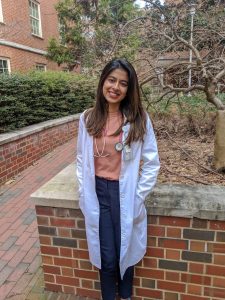 MEDI 408 – Hematology/Oncology Consults
MEDI 408 – Hematology/Oncology Consults
Rukhsaar Khanam, Sri Ramachandra Medical College and Research Institute (India)
What did you most like about your elective?
For my elective, I spent four weeks with two separate attendings. It was nice to get a take on how to tackle problems from two different perspectives. Also, it’s a consult service, not your primary care physician. This made it a different experience for me since it is heavily based on literature. This is not something I have experienced at my home school. The diseases are so new and so complex in this elective. For example, UNC is giving patients treatment that is not provided anywhere else. I felt that this was the forefront of treatment and UNC is using cutting edge technology. I’ve never seen this type of patient care before, it’s very up to date. These are things I never would have experienced anywhere else.
How has your experience at UNC added to your career goals?
Eventually I want to practice in the United States and I would like to match in a university program. There are a couple things at UNC that have prepared me for this. The EPIC system is pretty popular among other hospitals in the country and it was something I wasn’t exposed to before. Now, I’m not a master at using EPIC, but I can work my way around it and do the basic things. Also, I think it’s not only about being a good physician, I believe this experience is also about being able to get things done. So in order to do that I think this elective helped me learn the administrative side of things. For example how to get patient orders done, talk to families and get approval for drugs. Another thing is the encouragement to do research, I’m actually presenting later today. It’s been great to add literature and the newest research to my experience. The medical side is always there, it’s UNC and it’s a big name of course it’s known for its top-notch standard of care. But what I did learn is when you work in the university hospital you also have the opportunity to learn about administration and research.
Do you have any advice to share with future international visiting students?
It’s okay to feel uncomfortable. You are not going to feel like you belong here, because you don’t. This is a new experience, you need to be open to feeling uncomfortable with it and you should not feel afraid to ask for help. You’re may feel like a fish out of water but your job is to put yourself out there and learn from your peers, your fellows, and your attendings. This is a learning experience, no one expects you to be at the top of your game, just be okay feeling uncomfortable.